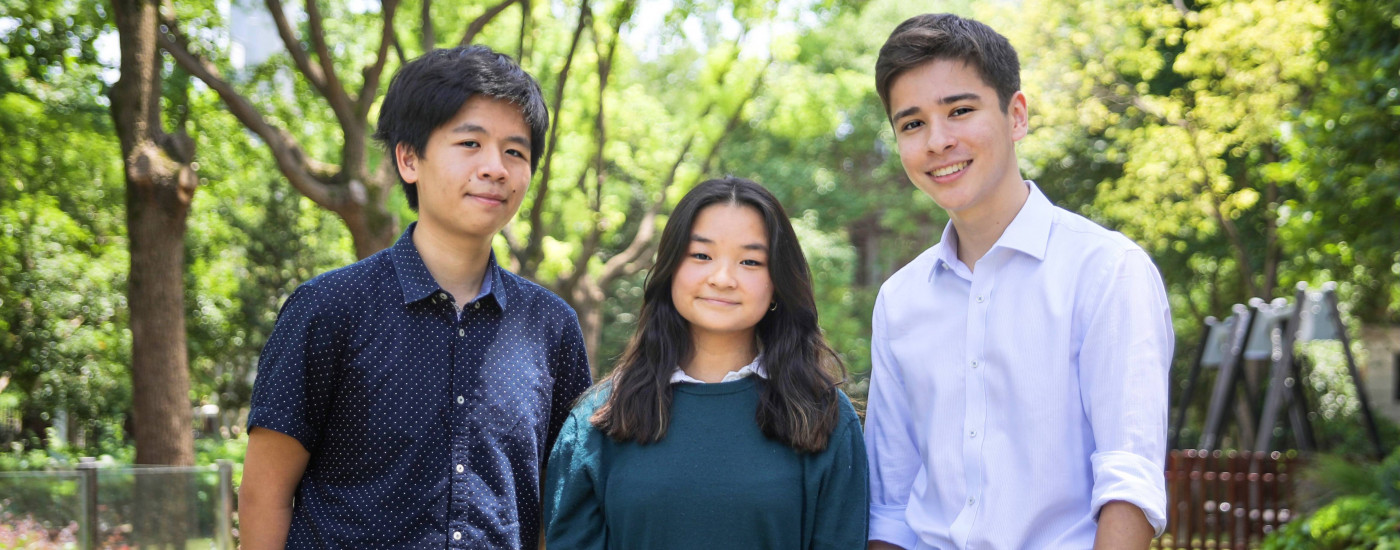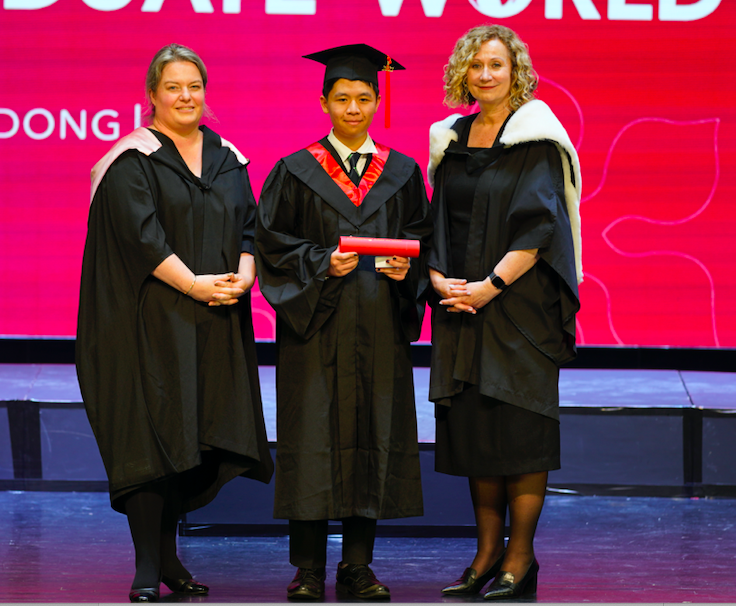Wisdom of the 45s: Our 2021 IBDP Perfect Score Students Speak

The Perfect 45. Straight 7s on HLs and SLs. Full points for the EE and CAS. Nailing a 45 on the IB is no easy task. Globally it is achieved by only 1.5% of examinees. And whilst we know very well that success in the IB is about much more than a number, we applaud those students who have worked hard to get into this exclusive club.
We sat down with John S, Nicky W, and Rosie G - our three perfect 45s from the Class of 2021 - to learn more about how they made it happen.
Big Challenges
First - and perhaps most tellingly - for these three students 45 was not an explicit goal. Focusing on process over outcome, they said, takes the pressure off, supported by a commitment to continual improvement. They all agreed with the old adage that slow and steady wins the race.
"I never thought I would get a 45," says Rosie, "I thought it was out of reach for me."

I told myself that as long as I try my best, that's all I can ever do.
"I wasn't really going for a number," says John, "I was just trying to do the best I could."
Adds Nicky, "I told myself that as long as I try my best, that's all I can ever do. Whether the final result was a 37 or a 42, that wouldn't really matter to me."
One imagines that Higher Level (HL) subjects would present the biggest stumbling block, but actually our three students make the case that Standard Levels (SL) are the most challenging. This is because students typically choose subjects for HLs which they are naturally better at.

IB requires that you really focus on things you might not necessarily be good at.
"I spent more time on my Standard Levels than my Higher Levels," says Rosie. "IB requires that you really focus on things you might not necessarily be good at."
For Rosie the Extended Essay and Theory of Knowledge (EE/ToK) were the most stressful parts of the IB. "You end up spending a lot of time on the subject," Rosie says. "There were times when I was thinking 'Oh my gosh, why am I doing this, why did I choose this topic?' So choose something that you really like, or you'll end up hating it in the end."
Finally, the IB covers a truly wide breadth and for John S simply staying on top of everything was the biggest challenge: "You have so many commitments - you've got CAS, ToK, internal assessments, external assessments - so unless you've got good time management skills, unless you stay proactive, you might fall behind and that gets a bit stressful."
Time Management
Needless to say, mastering time management is the stock-in-trade of IB success, but it is definitely not one size fits all. Each student needs to find the approach that's right for them.
Nicky W, for example, used the Pomodoro approach, a productivity technique developed in the 1980s which is gaining popularity today. "I spent a couple hours every day studying, so I didn't have to cram for exams," Nicky explains. "In the Pomodoro method you study for 25 minutes and then take a 5 minute break and then do that over and over again."

For John and Rosie getting into the study zone was key. "Work hard play hard, that was my mentality," John says. "So for me I would work hard for a block and then have a longer relaxation period. Each time I finished I felt like I had accomplished something and that gave me the motivation to do it again."
Says Rosie, "I'm more of a get in the zone and work for five hours type person. To do that I would ease myself into it, do the easier tasks first. And to make myself more motivated to study I always made my notes very visual. Color coding was really helpful for me."
Though the IB is a certainly a big commitment, it doesn't mean you have to drop your other interests. On the contrary IB is a great opportunity to put your passions to work for you.

The IB is really good at forcing you to stay interested in your hobbies.
"The IB is actually really good at forcing you to stay interested in your hobbies because of CAS [Creativity, Activity, Service]," Rosie says. "You can do things that you love and get credit for it."
Finally John makes the point that IB success really starts with the IGCSEs in Years 10 and 11; that's when you really get the opportunity to develop and master the time management techniques and study habits that will power you through the IB.
But it takes a village to ace the IB. Even though each student faces the final reckoning on their own, there are important support structures in place involving teachers, family, and friends which are critical to success.

Support from Teachers
Dulwich Pudong has a robust infrastructure in place to support students to do their best on the IB, one which has been honed and developed since we graduated our first IB class in 2009. It is built on personalisation and responsiveness.
John S cites the excellent lines of communications he had with the teachers here: "They are very understanding and open, that was always a big help for me. I was able to talk to them and let them know if, for example, I was not able to meet a deadline because of another subject or exam."
Rosie points to the use of technology by her teachers as a big help: "My teachers used technology really well to be able to support us. For example, if I had a question my maths teacher would send a video which talked through the approach to answering it." And, she notes, that this was not just during formal school hours but anytime she hit a wall.
DCSPD teachers deeply understand each individual student and are responsive to their particular needs, helping them in real time to find the answers they need to succeed.

Support from Family
Needless to say, family plays a critical role in IB outcomes, both for emotional support and also for academic.
"My parents were a big support," John says. "I would also talk to them and vent to them when I was a bit stressed. Their understanding of the IB process was important to me."

There would be days when I would be in my room for the entire day studying.
Nicky likewise cites his parents understanding of the IB workload: "There would be days when I would be in my room for the entire day studying. Them just being there for me when I need them was really helpful."
Rosie, meanwhile, liked to use her parents as a first audience for academic work: "I sometimes make the mistake in my writing of trying to sound too smart. So I would get my mom to read an essay and she would challenge me, 'What are you really trying to say here?' That was really helpful and benefited my writing a lot." She also used her parents as a ToK sounding board, having her parents present counter-arguments which she may not have thought of her own.
Support from Friends
Finally, friend networks and strong peer-to-peer relationships should not be overlooked in the quest for optimal IB outcomes, again both on the academic and emotional sides.
Nicky singles out his maths group chat where fellow students would post problems they were having and others would readily pitch in, part and parcel of the campus culture here in which everyone is happy to help out.
Rosie also points to the strong friendship groups she developed at DCSPD which provided much needed wellbeing relief from the stresses of IB.

Final Thought
Our three 45s are looking forward to building off their historic IB success at DCSPD and making an impact in the wider world. For them Living Worldwise means having a global view, valuing different perspectives and understanding what is happening in the real world beyond the Jinqiao bubble.
Let's leave the final word to John S: "Dulwich instills principles that help us become leaders. Having collaborative skills, being able to work independently, and the wellbeing support give us the confidence to thrive in any setting we find ourselves in the future."






